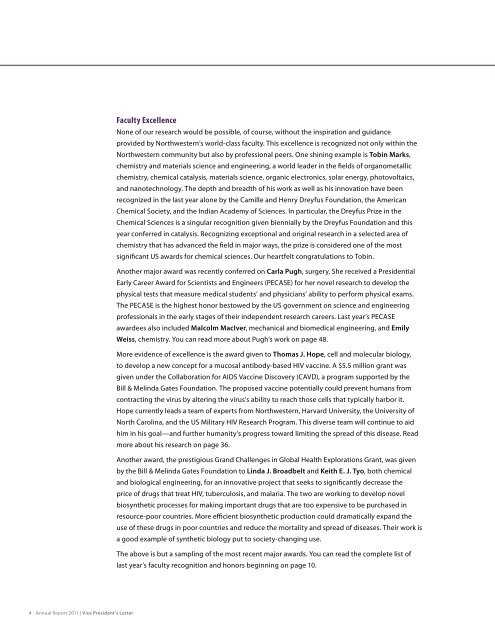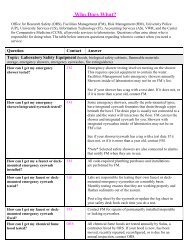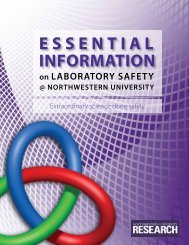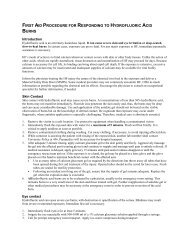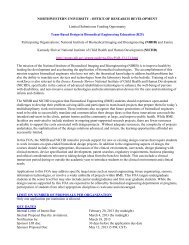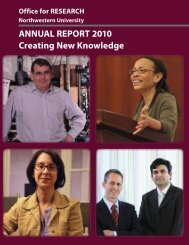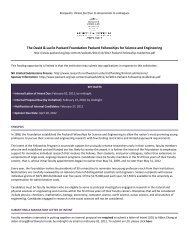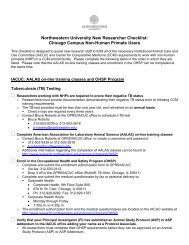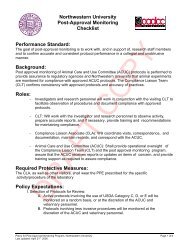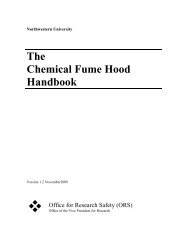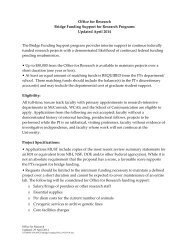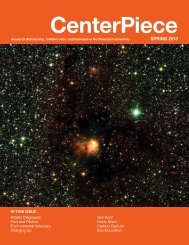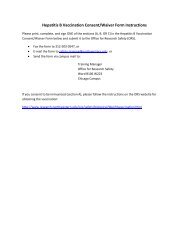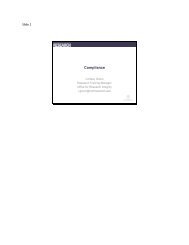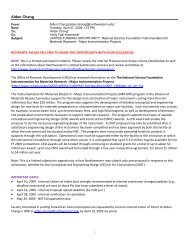annual report 2011 - Office for Research - Northwestern University
annual report 2011 - Office for Research - Northwestern University
annual report 2011 - Office for Research - Northwestern University
Create successful ePaper yourself
Turn your PDF publications into a flip-book with our unique Google optimized e-Paper software.
4 Annual Report <strong>2011</strong> | Vice President’s Letter<br />
Faculty Excellence<br />
None of our research would be possible, of course, without the inspiration and guidance<br />
provided by <strong>Northwestern</strong>’s world-class faculty. This excellence is recognized not only within the<br />
<strong>Northwestern</strong> community but also by professional peers. One shining example is Tobin Marks,<br />
chemistry and materials science and engineering, a world leader in the �elds of organometallic<br />
chemistry, chemical catalysis, materials science, organic electronics, solar energy, photovoltaics,<br />
and nanotechnology. The depth and breadth of his work as well as his innovation have been<br />
recognized in the last year alone by the Camille and Henry Dreyfus Foundation, the American<br />
Chemical Society, and the Indian Academy of Sciences. In particular, the Dreyfus Prize in the<br />
Chemical Sciences is a singular recognition given biennially by the Dreyfus Foundation and this<br />
year conferred in catalysis. Recognizing exceptional and original research in a selected area of<br />
chemistry that has advanced the �eld in major ways, the prize is considered one of the most<br />
signi�cant US awards <strong>for</strong> chemical sciences. Our heartfelt congratulations to Tobin.<br />
Another major award was recently conferred on Carla Pugh, surgery. She received a Presidential<br />
Early Career Award <strong>for</strong> Scientists and Engineers (PECASE) <strong>for</strong> her novel research to develop the<br />
physical tests that measure medical students’ and physicians’ ability to per<strong>for</strong>m physical exams.<br />
The PECASE is the highest honor bestowed by the US government on science and engineering<br />
professionals in the early stages of their independent research careers. Last year’s PECASE<br />
awardees also included Malcolm MacIver, mechanical and biomedical engineering, and Emily<br />
Weiss, chemistry. You can read more about Pugh’s work on page 48.<br />
More evidence of excellence is the award given to Thomas J. Hope, cell and molecular biology,<br />
to develop a new concept <strong>for</strong> a mucosal antibody-based HIV vaccine. A $5.5 million grant was<br />
given under the Collaboration <strong>for</strong> AIDS Vaccine Discovery (CAVD), a program supported by the<br />
Bill & Melinda Gates Foundation. The proposed vaccine potentially could prevent humans from<br />
contracting the virus by altering the virus’s ability to reach those cells that typically harbor it.<br />
Hope currently leads a team of experts from <strong>Northwestern</strong>, Harvard <strong>University</strong>, the <strong>University</strong> of<br />
North Carolina, and the US Military HIV <strong>Research</strong> Program. This diverse team will continue to aid<br />
him in his goal—and further humanity’s progress toward limiting the spread of this disease. Read<br />
more about his research on page 36.<br />
Another award, the prestigious Grand Challenges in Global Health Explorations Grant, was given<br />
by the Bill & Melinda Gates Foundation to Linda J. Broadbelt and Keith E. J. Tyo, both chemical<br />
and biological engineering, <strong>for</strong> an innovative project that seeks to signi�cantly decrease the<br />
price of drugs that treat HIV, tuberculosis, and malaria. The two are working to develop novel<br />
biosynthetic processes <strong>for</strong> making important drugs that are too expensive to be purchased in<br />
resource-poor countries. More e�cient biosynthetic production could dramatically expand the<br />
use of these drugs in poor countries and reduce the mortality and spread of diseases. Their work is<br />
a good example of synthetic biology put to society-changing use.<br />
The above is but a sampling of the most recent major awards. You can read the complete list of<br />
last year’s faculty recognition and honors beginning on page 10.


